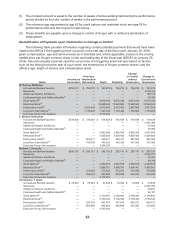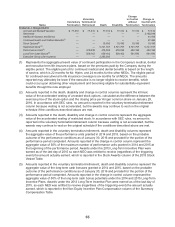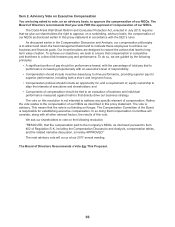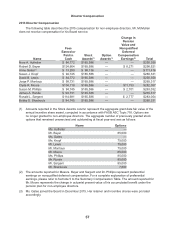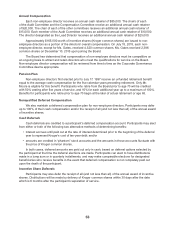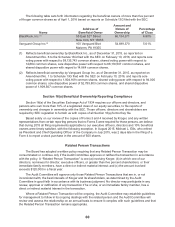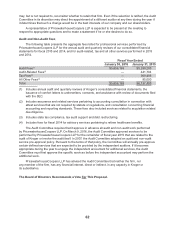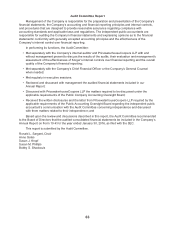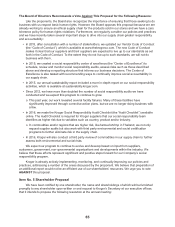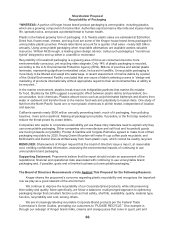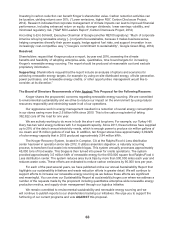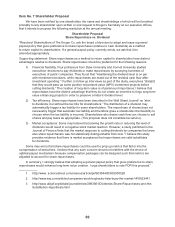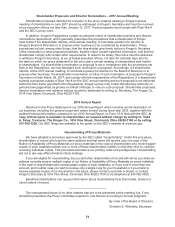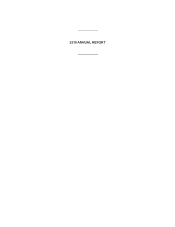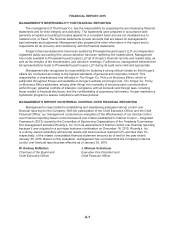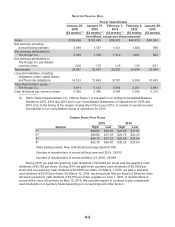Kroger 2015 Annual Report Download - page 66
Download and view the complete annual report
Please find page 66 of the 2015 Kroger annual report below. You can navigate through the pages in the report by either clicking on the pages listed below, or by using the keyword search tool below to find specific information within the annual report.64
Item No. 4 Shareholder Proposal
We have been notified by nine shareholders, the names and shareholdings of which will be
furnished promptly to any shareholder upon written or oral request to Kroger’s Secretary at our executive
offices, that they intend to propose the following resolution at the annual meeting:
The Kroger Company
Human Rights Risk Assessment - 2016
“RESOLVED, that shareholders of The Kroger Co. (“Kroger”) urge the Board of Directors to report to
shareholders, at reasonable cost and omitting proprietary information, on Kroger’s process for identifying
and analyzing potential and actual human rights risks of Kroger’s operations and supply chain (referred to
herein as a “human rights risk assessment”) addressing the following:
• Human rights principles used to frame the assessment
• Frequency of assessment
• Methodology used to track and measure performance
• Nature and extent of consultation with relevant stakeholders in connection with the assessment
• How the results of the assessment are incorporated into company policies and decision making.
The report should be made available to shareholders on Kroger’s website no later than
October 31, 2016.
Supporting Statement
As long-term shareholders, we favor policies and practices that protect and enhance the value of
our investments. There is increasing recognition that company risks related to human rights violations,
such as litigation, reputational damage, and project delays and disruptions, can adversely affect
shareholder value.
Kroger, like many other companies, has adopted a supplier code of conduct (See The Kroger
Company Standard Vendor Agreement) but has yet to publish a company-wide Human Rights Policy,
addressing human rights issues and a separate human rights code that applies to its suppliers.
Adoption of these principles would be an important first step in effectively managing human rights risks.
Companies must then assess risks to shareholder value of human rights practices in their operations and
supply chains to translate principles into protective practices.
The importance of human rights risk assessment is reflected in the United Nations Guiding
Principles on Business and Human Rights (the “Ruggie Principles”) approved by the UN Human Rights
Council in 2011. The Ruggie Principles urge that “business enterprises should carry out human rights due
diligence... assessing actual and potential human rights impacts, integrating and acting upon the findings,
tracking responses, and communicating how impacts are addressed.” (http://www.business-humanrights.
org/media/documents/ruggie/ruggie-guiding-principles-21-mar-2011.pdf)
Kroger’s business exposes it to significant human rights risks. As of year-end 2014, Kroger
operations, including supermarkets, convenience and jewelry stores, are located in over 40 states.
While over 90% of Kroger’s business is food its vendor Code of Conduct is based heavily on compliance
with the law, and U.S. agricultural workers are excluded from many labor laws that apply to other U.S.
workers. The company’s supply chain is complex and global and violations of human rights in Kroger’s
supply chain can lead to negative publicity, public protests, and a loss of consumer confidence that can
have a negative impact on shareholder value.
We urge shareholders to vote for this proposal.”


